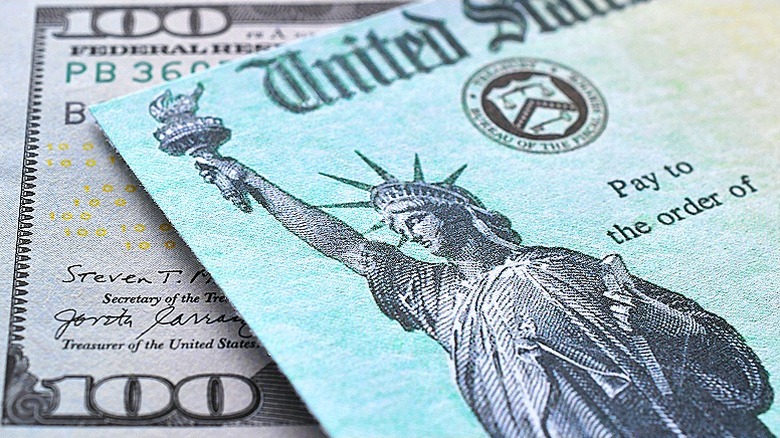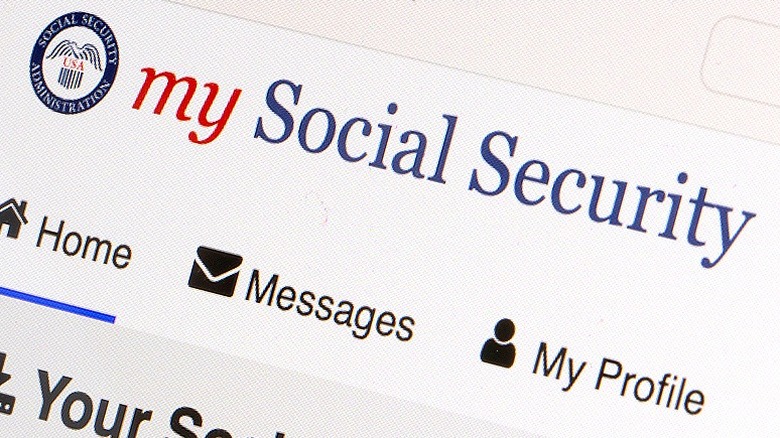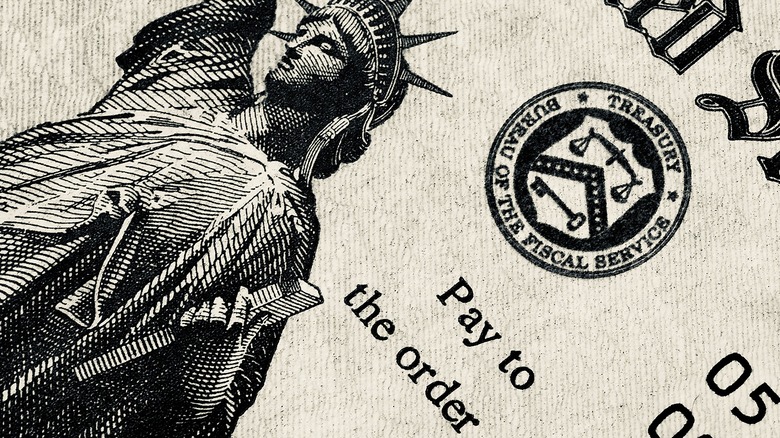Here's When The IRS Is Allowed To Garnish Your Social Security
Wage garnishment is the final recourse for the collection of debts by a debtor through the court system. It allows the debtor to take what you owe directly off your paycheck in the form of funds withheld by your employer. Aside from being embarrassing, it also messes up your household earnings. It's also a tool the Internal Revenue Service uses to collect back taxes owed, and what's more, the IRS can legally garnish wages from your paycheck, take money directly from your bank accounts, and seize as well as sell assets up to and including your vehicles, homes, or other valuables. While this may not be surprising to you, it may shock you to learn the IRS can also garnish your Social Security benefits.
While the Social Security Act allows for the clawing back of your current and forthcoming benefits for child support, court ordered money owed to the victim of a crime, or alimony, the IRS can also come after your Social Security for unpaid back taxes. The revenue service can take a decent percentage off every Social Security payment until you make good on what you owe, which sounds like a problem to avoid if you're living on a razor-thin budget. Not allowing this to happen is just one of a few strategies to minimize your tax liability in retirement.
How much can the IRS garnish?
The IRS can garnish as much as 15% of your Social Security benefits and, unlike private companies or individuals, the revenue service doesn't need a court order to do it. Of course, you do get some warning before this happens. The Federal Payment Levy Program (FPLP) is authorized by Internal Revenue Code Section 6331 (h) to collect your back taxes from federal payments including Social Security Benefits. The FPLP will typically send you a warning in the form of a final notice called a "Notice of Intent to Levy and Notice of Your Right to a Hearing." This is where you should read the notice carefully and take advantage of the opportunity to pay what you owe if you can or dispute the claim.
You have 30 days from the date of the notice to either make your payment or set up a scheduled arrangement to pay your arrears taxes before the IRS starts taking up to 15% from your Social Security. While you do have the ability to claim hardship as a result of the payments in order to escape this situation — hardship defined as being incapable of meeting the necessities of basic living — you will still need to provide the IRS with proof of this with financial records. Otherwise, the IRS is authorized to levy the 15% garnishment against you even if the remainder of your benefit adds up to less than $750.
Keeping your Social Security from garnishment
Much like your physical health, the best way to protect your financial health is through prevention. One of the best ways to do this is by not procrastinating during tax season. Getting an early jump on your taxes means learning what you owe sooner, so you have extra time to sort out your tax situation before you get to garnishment. It's simply one of the reasons why it pays to file taxes early.
Don't wait for a letter from the IRS to find out you owe back taxes. Go over your tax returns every year to ensure they've been filed correctly since an error can cause you to owe more than you do. Set up an online account with the IRS and view your records there to figure out if you have any back taxes owing or call the IRS directly to inquire. It's a good idea to have an accredited accountant on side to help you with your tax situation.
If you owe the IRS money, calculate how much, considering interest and late penalties applied for the years of missed payments. Set up a scheduled payment arrangement or pay off the whole thing in full if you can. Keep in mind, the onus is on you to keep track of what you owe since the IRS has 10 years to collect what you owe and the interest and late fees will only accumulate over time. (Read about what really happens when you don't pay your taxes on time.)


